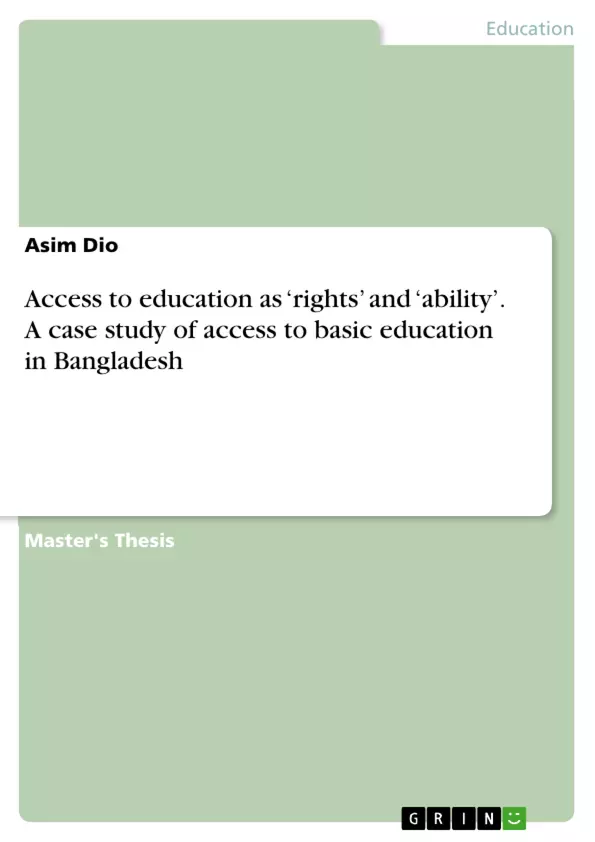Education is a catalyst for human development. Considering this fact access to basic education is made free and compulsory for all citizens in Bangladesh. Government has been taking numerous policy measures and programmatic interventions to enhance the access to education and thus to achieve the target of 100 per cent access to education by 2015. However this study using secondary research method reveals that despite of achievements in some areas there are still notable gaps between achievements and targets.
This study uses an analytical lens constructed with rights and ability notions of access. It analyses the present scenario in access to education to explore to what extent the education system is providing rights of access to education. At the same time it examines the efficiency of the education system and policies to what extent those are able to empower the students with ability to enter, sustain and succeed in basic education.
The study has found commendable achievement in enrollment and gender disparity. However, from the ability perspective the education system is still not enough inclusive with ethnic and socio-economic disparity. Special measures need to be taken in the area of access to education of children with special needs, access to education of indigenous peoples and more investments in infrastructure.
Inhaltsverzeichnis (Table of Contents)
- SECTION 1: INTRODUCTION
- Focus and objectives of the project
- Research questions and associated propositions
- An overview of the analytical framework and its application
- Research methodology
- Overview of the project
- SECTION 2: ANALYTICAL FRAMEWORK
- Introduction
- Access as 'right' and ‘ability’
- Access 'right' and 'ability' in relation to education
- Access 'right' and ‘ability' in relation to education in the context of the Sustainable Development Goals
- A synthesis
- SECTION 3: EMPIRICAL ANALYSIS
- Introduction
- Policy commitments: recognising the 'right' to access education
- Policy commitments: recognising the ‘ability' to access education
- Policy achievements: fostering the 'right' to access education
- Policy achievements: fostering the ‘ability' to access education
- The special case of Indigenous Peoples' access to education
- Beyond 2015: access to education and the underlying significance of the Sustainable Development Goals
- A synthesis
- SECTION 4: CONCLUSION
- Main findings & their significance
- Policy recommendations
- Suggested lines of future research
- Concluding observations
Zielsetzung und Themenschwerpunkte (Objectives and Key Themes)
This study aims to analyze the state of access to basic education in Bangladesh, examining the extent to which the education system provides rights of access and empowers students with the ability to succeed. The study employs an analytical framework incorporating "rights" and "ability" notions of access, analyzing the achievements and gaps in the education system.
- Access to basic education as a right and a practical ability
- Analysis of policy commitments and achievements in promoting education access
- Exploration of disparities in access related to socioeconomic background, ethnicity, and special needs
- Examining the role of the Sustainable Development Goals in shaping future access to education
- Identifying areas for improvement and suggesting policy recommendations
Zusammenfassung der Kapitel (Chapter Summaries)
- SECTION 1: INTRODUCTION - This section sets the context of the study, outlining its focus on access to basic education in Bangladesh, the research questions, and the analytical framework used. It also introduces the research methodology and provides an overview of the project.
- SECTION 2: ANALYTICAL FRAMEWORK - This section dives deeper into the theoretical foundation of the study, explaining the "rights" and "ability" notions of access and how they apply to education. It further discusses the connection between education access and the Sustainable Development Goals.
- SECTION 3: EMPIRICAL ANALYSIS - This section delves into the empirical analysis of the study, examining both policy commitments and achievements related to access to education in Bangladesh. It explores disparities and challenges in achieving equal access, including the specific case of Indigenous Peoples.
Schlüsselwörter (Keywords)
The main keywords and focus topics of the study include: access to education, Bangladesh, rights, ability, education system, policy commitments, policy achievements, disparities, Indigenous Peoples, Sustainable Development Goals, empirical analysis, analytical framework.
Frequently Asked Questions
What is the focus of the study on education in Bangladesh?
The study examines access to basic education using an analytical lens of "rights" (legal entitlement) and "ability" (the practical power to enter and succeed).
Has Bangladesh achieved its education targets?
While there have been commendable achievements in enrollment and gender parity, notable gaps remain in reaching 100 per cent access due to socio-economic and ethnic disparities.
What are the main barriers to educational access identified?
Key barriers include socio-economic status, ethnic background, and the lack of infrastructure for children with special needs or indigenous populations.
How do the Sustainable Development Goals (SDGs) relate to this study?
The study analyzes education access in the context of the SDGs to evaluate how policies empower students to sustain and succeed in basic education beyond 2015.
What policy recommendations does the study suggest?
The study recommends more investment in infrastructure and special measures for inclusive education for indigenous peoples and children with special needs.
- Citation du texte
- Asim Dio (Auteur), 2015, Access to education as ‘rights’ and ‘ability’. A case study of access to basic education in Bangladesh, Munich, GRIN Verlag, https://www.grin.com/document/338439



